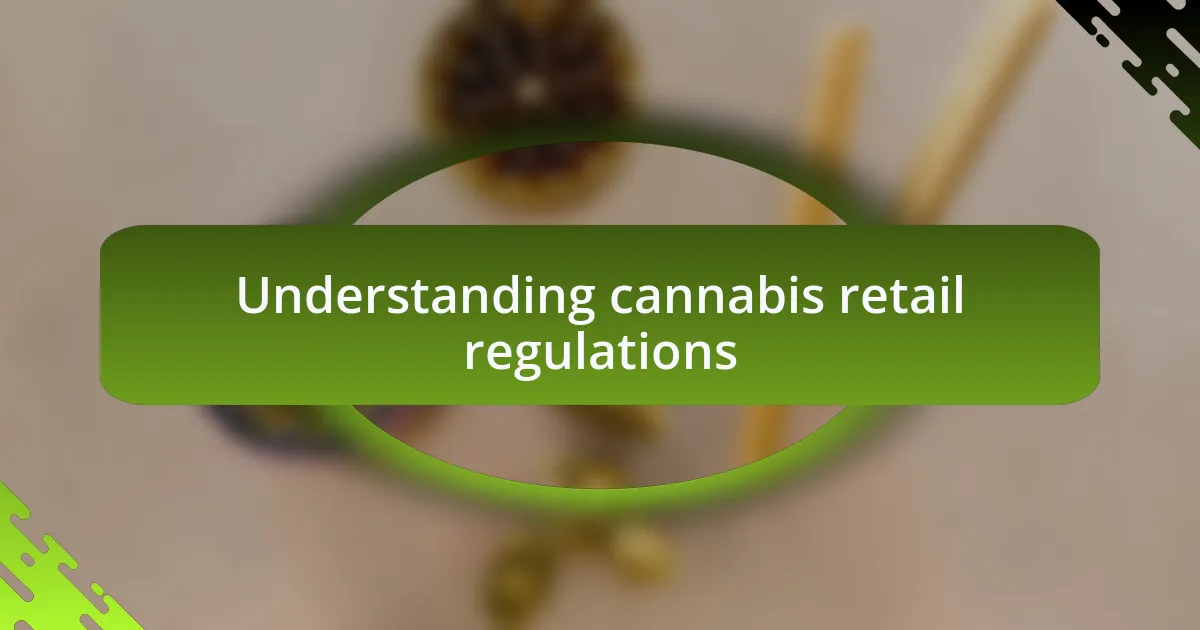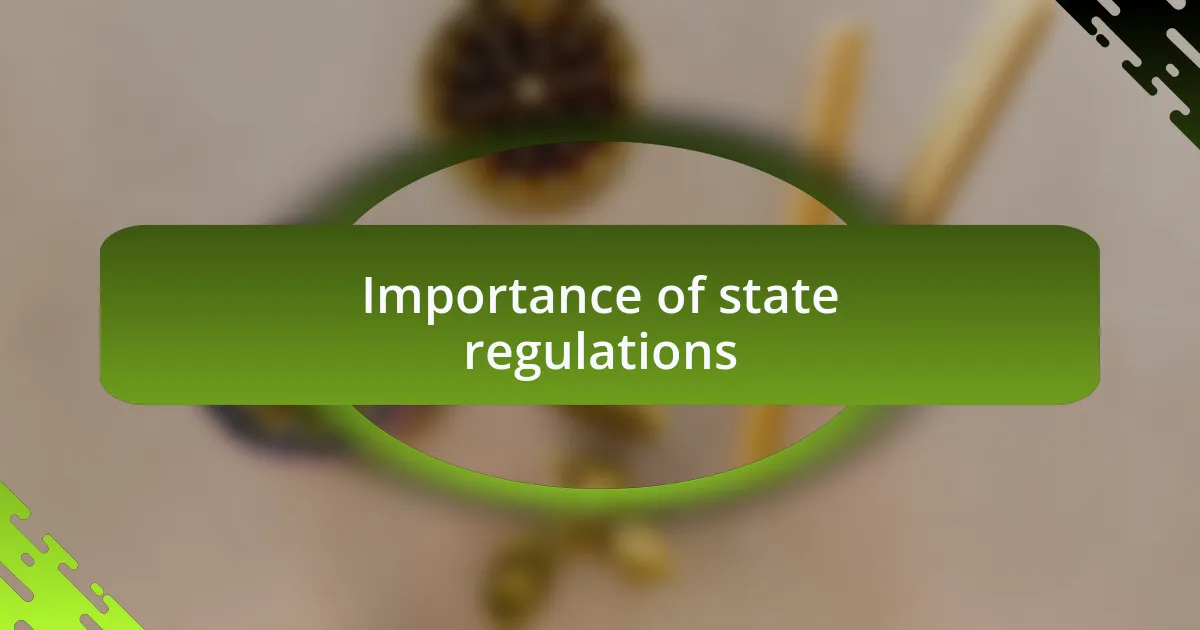Key takeaways:
- Understanding and adapting to varying state regulations is essential for cannabis retail success, impacting product availability and customer trust.
- Building relationships with local regulators and engaging in compliance training enhances operational transparency and community trust.
- Flexibility in navigating unexpected regulatory changes can turn challenges into growth opportunities.
- Future trends indicate a move towards regulatory standardization and a focus on social equity within the cannabis industry.

Understanding cannabis retail regulations
Navigating cannabis retail regulations can sometimes feel like wandering through a maze. I recall my first encounter with these rules—it was both daunting and enlightening. I remember poring over documentation, trying to decipher the myriad of local laws. Each regulation often left me wondering how it all fit together, and I still feel a rush of unease when I think about those early days.
Every state has its unique approach, which means what works in one area may not work in another. The patchwork of regulations can leave retail owners feeling overwhelmed. I’ve often asked myself, how can one keep up with such rapid changes? Keeping abreast of both state and local laws is essential, and I quickly learned the importance of building relationships with local regulators, which helped me better understand the nuances of compliance.
Moreover, I’ve experienced firsthand the impact of these regulations on product availability and customer experience. For instance, when new laws were implemented, certain products vanished overnight, impacting sales. It taught me the critical lesson that being adaptable is not just important; it’s a necessity in this evolving landscape of cannabis retail.

Importance of state regulations
State regulations play a vital role in shaping the cannabis retail landscape. I vividly recall the anxiety I felt when a new regulation rolled out unexpectedly; it seemed like a curveball that could derail my business plans. The intricate dance between legality and commerce made me appreciate how crucial these rules are—they not only safeguard consumer health but also help legitimate businesses thrive.
In my experience, state regulations can also foster a sense of trust within the community. When retailers comply with stringent standards, it reassures customers that they are purchasing safe, quality products. There was a moment when I received positive feedback from a loyal customer who felt more confident returning after I explained how regulations guided our product choices. It reinforced the idea that transparency nurtures loyalty.
Furthermore, I’ve seen how regulations can level the playing field among cannabis retailers. I remember discussing with fellow shop owners how some regulations can appear burdensome, yet they actually prevent monopolies and unfair practices. It made me think: without these state laws, would the cannabis industry be as equitable? Ensuring compliance doesn’t just protect us from penalties; it fosters a community of fairness and integrity.

Navigating the regulatory landscape
Navigating the regulatory landscape can feel like traversing a maze, especially when state requirements seem to shift unpredictably. I recall a particularly challenging month when a last-minute amendment altered our labeling requirements just before a major product launch. It forced me to adapt quickly, and I found myself questioning if I had the right systems in place to stay ahead. This experience underscored the importance of being proactive—building relationships with local regulatory bodies can provide valuable insights and help clear the confusion.
As I delved deeper into the compliance measures, I began to appreciate the nuances of our obligations. There was a specific training session I attended that stressed the importance of maintaining meticulous records; it struck me as tedious at first. However, I quickly realized that these procedures not only kept the business safe but also played a pivotal role in building credibility with consumers. Wouldn’t you want to know that the products you’re purchasing meet stringent safety standards? That understanding transformed my approach to compliance from a burden into a critical asset.
In my daily interactions with customers, I often find myself addressing common misconceptions about cannabis regulations. The fear of illegal products often looms large, and I see it reflected in their questions. I remember a hesitant customer who seemed unsure about trying something new, but after explaining the regulatory framework that governs our industry, their apprehension turned into excitement. This interaction taught me that navigating the regulatory landscape is not just about compliance; it’s about educating and empowering our community. How can we expect trust to flourish if we don’t engage in open conversations about these very regulations?

My journey in cannabis retail
The journey into cannabis retail has been a mix of excitement and challenge. I still remember my first day in the store—it was overwhelming. The sheer amount of product knowledge I needed to have felt like climbing a steep hill. Yet, as I engaged with customers, my confidence started to build. Their questions not only tested my understanding but also fueled my passion for this rapidly evolving industry. Have you ever experienced that moment when you realized you were truly learning?
As I navigated state regulations, I faced moments that tested my patience. One time, after an inspection, we received a surprise notice about compliance issues. Initially, the anxiety was palpable; I feared how it would affect our reputation. However, that moment turned into a learning opportunity. I gathered my team, and we made it a point to dive deep into our policies and practices. We emerged stronger and more united, understanding that compliance isn’t just a checklist; it’s a commitment to our community.
Along the way, I’ve had my share of enlightening conversations with customers that really shaped my perspective. There was this one gentleman who walked in, skeptical and with a furrowed brow. He had heard horror stories about unregulated products and wondered how we could ensure safety. I took the time to share our rigorous sourcing methods and compliance certifications. Watching his expression shift from doubt to relief was a reminder that our work extends beyond selling products; it’s about fostering a sense of security and trust. Isn’t that why we invest so much effort into understanding regulatory frameworks?

Challenges faced during compliance
One challenge I consistently faced was the ever-changing nature of state regulations. Just when I thought I had a handle on everything, new rules would emerge, often requiring immediate adjustments. I vividly recall a moment when our packaging needed to be redesigned overnight to meet stricter labeling requirements. You can imagine my frustration; it felt like chasing a moving target. How do you keep pace without sacrificing quality?
Then there was the issue of training staff on compliance protocols. I remember gathering my team for a late afternoon session, armed with a thick binder filled with new guidelines. It was exhausting, and I could see the weariness in their eyes. Yet, I understood the importance of this training—you don’t just want people behind the counter; you want knowledgeable advocates for the product. Have you ever noticed how effective a well-informed team can be in easing customer concerns?
Finally, let’s not overlook the financial burden of compliance itself. I once found myself stressed over the looming compliance costs after a surprise audit revealed necessary upgrades to our security systems. The weight of meeting those requirements while ensuring we remained profitable was a delicate balancing act. This reality made me question: how can we ensure compliance without jeopardizing our financial health? It’s an ongoing struggle, but I believe it’s crucial to find that balance for sustainable growth.

Lessons learned from regulatory experiences
Understanding the nuances of regulatory compliance taught me that flexibility is key. I recall an instance when a sudden change in the zoning laws forced us to shift our retail location almost last minute. The stress was palpable, but it served as a crucial reminder that adaptability can turn potential setbacks into opportunities for growth. Are we not better equipped when we embrace change rather than resist it?
Another significant lesson emerged from navigating reporting requirements. While I initially viewed them as a burden, I later realized these processes could enhance operational transparency. After streamlining our reporting, I noticed a boost in team morale as we all felt more aligned in our objectives. Have you experienced how clarity in communication can foster a stronger team dynamic?
Finally, engaging with other cannabis retailers has shown me the importance of collaboration in tackling regulatory challenges. I remember attending a conference where we shared compliance strategies, and the collective wisdom was invaluable. It was clear that pooling our experiences not only eased individual burdens but also strengthened our industry as a whole. Isn’t it refreshing to know that we can learn together and create a more robust framework for all?

Future trends in cannabis regulations
The landscape of cannabis regulations is shifting towards increased standardization. I’ve noticed a trend where states are starting to align their rules more closely, making compliance easier for retailers who operate in multiple markets. Have you ever felt overwhelmed by the varying regulations? It’s encouraging to see a push for consistency that could simplify our processes.
I’m also excited about the growing focus on social equity in regulatory frameworks. After attending a recent seminar on cannabis legislation, I learned about programs aimed at helping marginalized communities enter the market. I felt a spark of hope when I heard success stories from individuals who had faced significant barriers. Isn’t it empowering to think that these regulations could reshape the industry to be more inclusive and diverse?
Finally, technology is becoming an integral part of compliance. I’ve seen firsthand how data management systems can streamline the reporting process. Recently, I integrated a new software tool that not only reduced our workload but also minimized errors in submissions. Doesn’t it make sense to leverage technology as a partner in navigating these complex regulations?